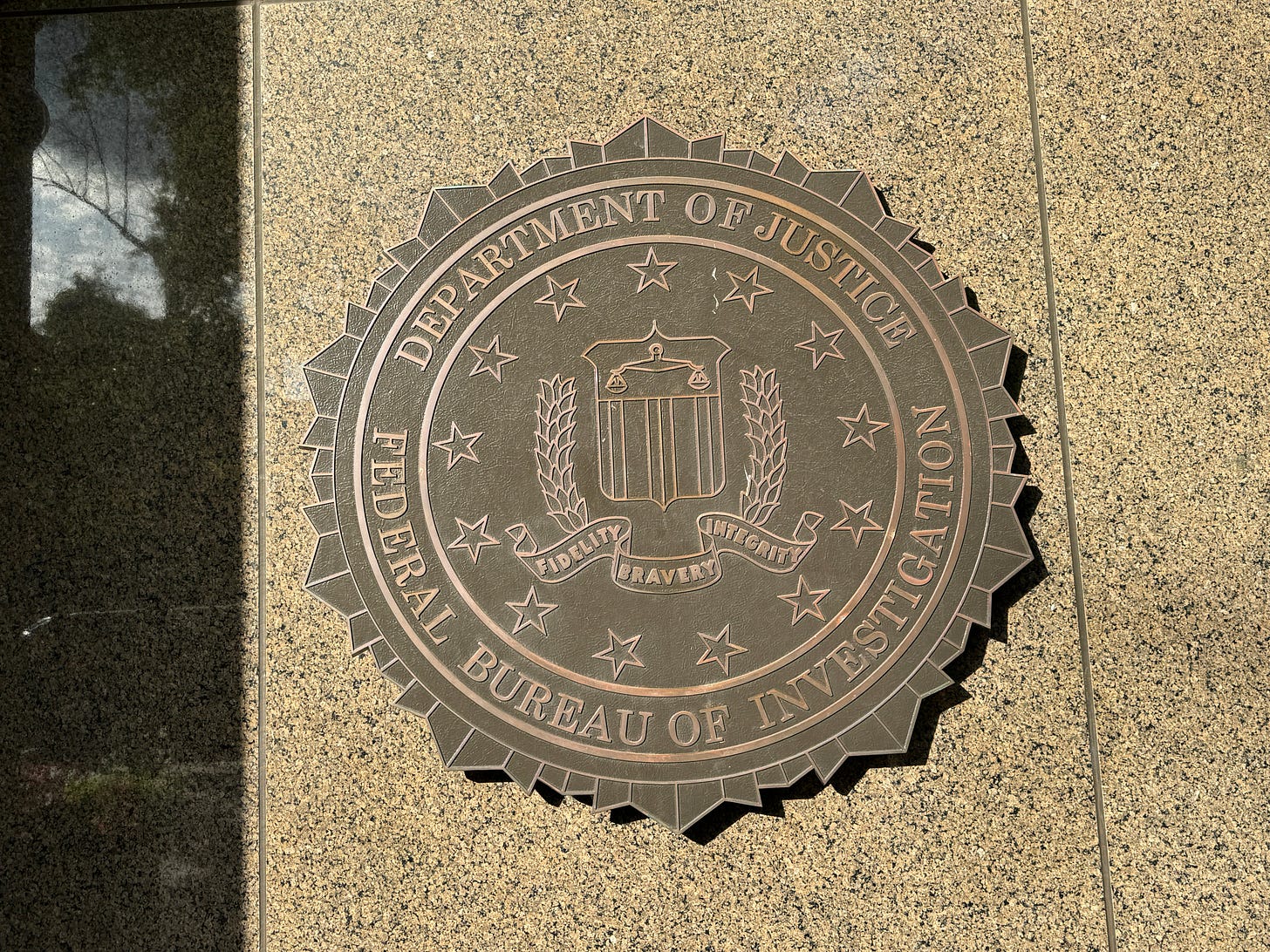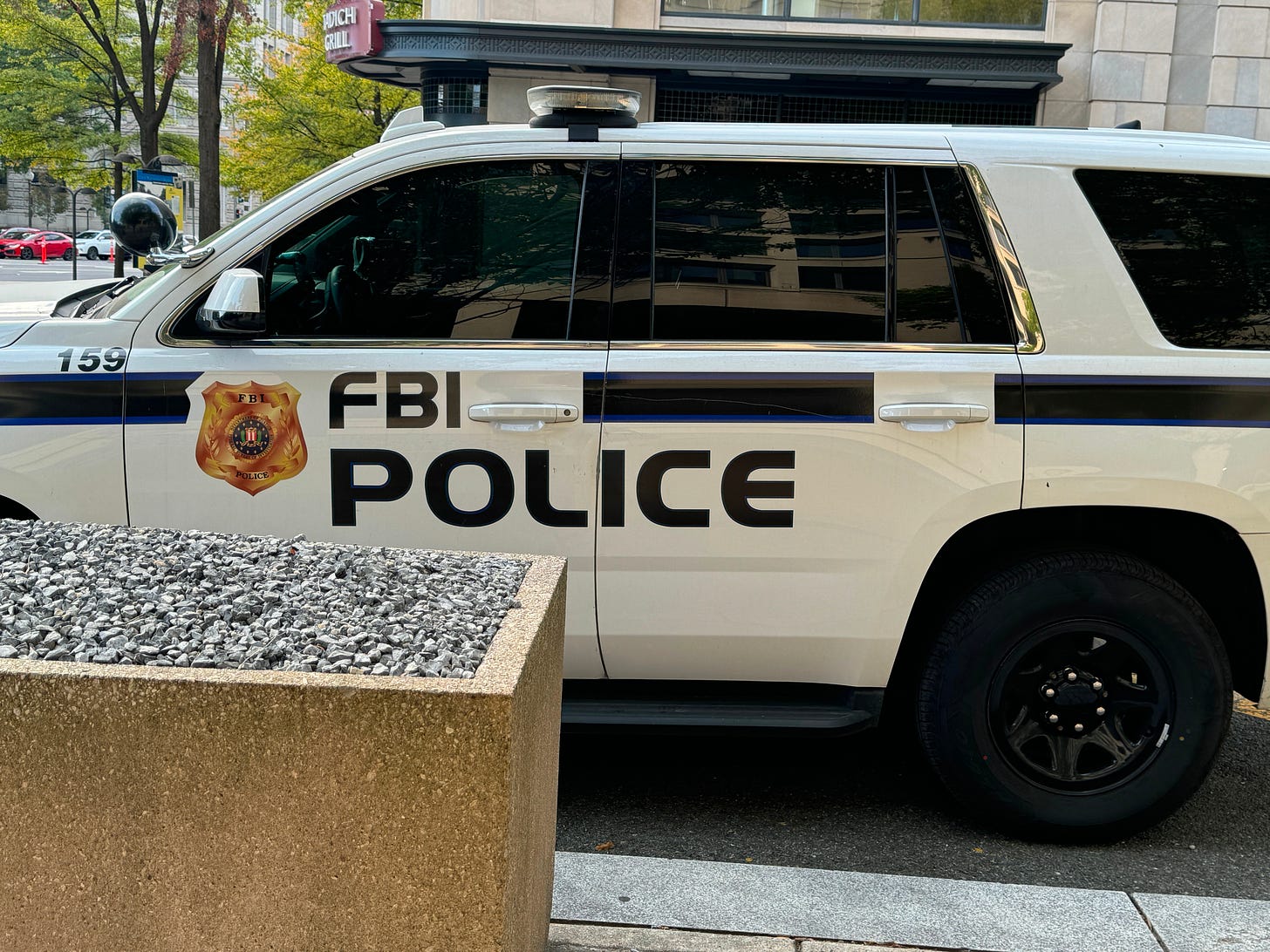“In the early years of the Cold War between the United States and the Soviet Union, the Central Intelligence Agency harbored an uncomfortable secret about itself,” wrote David Hoffman in the first words of his stellar book, The Billion Dollar Spy. “The CIA had never really gained an espionage foothold on the streets of Moscow.”
That line came back to me when I was exposing China’s den of spies in Washington. Because I kept hearing a certain frustration: that the FBI was botching China on the streets of the United States.
What follows are conversations with former senior counterintelligence agents from the FBI who spoke on the condition of anonymity because of the sensitivity of their experiences and because they weren’t authorized to speak. I have taken out certain details that could endanger people. Some still work in the government. And some of their remarks are graphic.
‘We fucked it up’
“I was in touch with a PLA guy and he wanted to work with us and we fucked it up,” one of the former agents told me.
He said a man had contacted one of his sources. The man had claimed he was in the People’s Liberation Army (PLA) and that he had classified documents from hacking PLA servers. Was the guy legit or was he a dangle — someone from Chinese intel who was sent on a mission to compromise the FBI? The former agent turned to the CIA.
“The CIA sat on it for a year without doing anything,” the former agent told me. “So I just kept getting more frustrated… It was always like, ‘We’re trying to get our ducks in a row,’ blah, blah, blah, some kind of bullshit.”
MI6 learned of the man through a different situation. “They said, ‘Boy, we wish that we would have a shot at this guy.’” And eventually, the Brits had their chance. “They basically said in their determination, this guy was real. He was in the PLA, he did have this stuff.”
But then the man disappeared.
“He was either found out and killed, or got cold feet,” the former agent said. But at least a year and a half had already passed. “We missed out on all of that opportunity to get our hands on whatever he had, vet whatever we could have.”
I wondered how common that story was — a counterintelligence version of “the one who got away.” And as if reading my mind, the former agent went on to say, “That kind of stuff just happened all the time.” Then he told me about another missed opportunity.
In 2020, a longtime, trusted source — a Chinese dissident — came to him with an unusual story. The dissident told him, “The other day, this Chinese guy came up from [a U.S. city] on a bus and started asking me questions about all my dissident friends.” The stranger offered to give the dissident seed money to start an organization, if the dissident introduced him to his friends. The stranger also said he had graduated from a certain Chinese university — one that is known for cultivating intelligence officers.
That set off alarm bells to the former FBI agent. So he said he pulled up the man’s visa details and confirmed that he had graduated from the university. Then he learned that the man’s sister worked at NASA and was on the cusp of getting citizenship. (“NASA was freaking out over this,” he said.) She also had a son who was a U.S. citizen, employed by a private company contracted by the government to design U.S. military aircraft. He had a secret clearance.
“So I tell headquarters this, I tell [the FBI field office] this, and nobody gave a shit,” he said. “Nobody could care less. It didn’t raise any red flags for anybody. I was ballistic.”
These were Covid times, and China had closed up. The man was stuck in the United States, according to the former agent. He was using a burner phone, but the former agent traced enough of his cell phone records to believe that he was staying at a hotel on the East Coast. He asked the FBI’s corresponding field office to check into it for him. He had expected they would show up with a photo of the man and ask hotel staff if they had seen him. “And you know what they did?” he said, his voice was thick with disillusionment. “They just called the hotel and asked, ‘Hey, is Mr. — staying at your hotel?’”
‘Die tired’
Another retired counterintelligence agent described a series of challenges that predated these incidents. A few years into his tenure, then-President Barack Obama launched a whole of government approach to address China’s intellectual property theft, especially efforts emanating from their NSA equivalent, 3PLA. “We literally had to lobby to allow the counterintelligence folks to be a part of those discussions,” this former agent said. Tensions between the FBI’s cyber and counterintelligence divisions had officially begun.
There was also a lack of communication between as many as five operational divisions that had overlapping interests. “We weren't able to connect the dots even within our own structure,” said the source. The public corruption division could be running an investigation into a politician because “a lot of local and state elections were being manipulated by China even back in that time frame,” he said. “We wouldn't necessarily have visibility on that in the counterintelligence division.”
I asked him about other missed opportunities to monitor, recruit, and run double agents from China. “There were opportunities that were missed,” he told me. Especially during Sky Net and Fox Hunt, covert Chinese operations starting in 2015 to hunt down and repatriate fugitives, whistleblowers, dissidents, and businesspeople. “That was a huge missed opportunity.”
Not everything went wrong. There were talented people who were dedicated to the mission. “What I would say is we had moments of brilliance. But the problem was we couldn't sustain it,” he said. He chalked it up to political cycles, budgets, promotions, “or certain philosophies.”
The former agent also said that FBI efforts with DARPA, IARPA, and other Defense Department entities failed to shrink the immense battlefield that China fought on. “What we were trying to do from a national level is just say, ‘Hey, we don't have enough people to [protect everything], but tell us what the game-changing technologies are that we cannot lose.’”
Even if thousands of Chinese operatives were gathering intelligence on a certain topic, he believed that all the FBI had to do was recruit a few people to share bad information, sowing doubt and discord. “Instead of patrolling a thousand streams, all those streams empty into three rivers. Let's just pee in three rivers,” he said.
But the community never could say what their game-changing technologies were. “We just couldn't settle on a way to push back with the limited resources we had,” he said. “China throws so many things that I always joked that they just wanted us to die tired.”
Triage, racism, and the FBI’s ‘second-class citizens’
A third retired senior counterintelligence agent told me simply, “We're outclassed.” His stark assertion is made more grim with the knowledge that China is a place of rare bipartisan and bicameral concern in our divided country. Was it really that bad, or had I just stumbled on some agents who were bitter as hell?
“The best way to find a spy is with a spy,” he said. “The FBI doesn't engage in enough offensive counterintelligence matters to run double agent operations, to manipulate and control Chinese operations and deceive them and disrupt them that way. They like to sit back and take the cop-like mentality towards counterintelligence and just wait for the phone to ring.”
He said in his career, he saw little support for counterintelligence agents. “Unless you're in New York or D.C., where counterintelligence gets a little more sway because of what's going on in these towns, [in] every other FBI field office in America, counterintelligence programs are kicked in the nuts. I mean, the [Special Agents in Charge] in those offices, they could give a shit about them.”
One of the other retired agents echoed the sentiment. “We've always been the redheaded stepchildren, treated sort of like second-class citizens” from day one.
Both said that many FBI agents sense a stigma and don’t want to work counterintelligence. The ones that do prefer Russia, with its alluring KGB legacy. “We understand it better. And it's something we've had more of a history with,” one of them said. China is “alien to us.”
That mentality is one reason why the FBI didn’t and doesn’t have enough analysts with Mandarin fluency, both said. “I only knew one analyst in the bureau when I was in the China section that spoke Mandarin. And then she's not even at headquarters anymore,” said the former agent who claimed the U.S. is outclassed.
“Abysmal,” said the other. His friends at headquarters tell him they want to leave, and they’re often operating at half of their strength. “Morale is terrible. They don't have enough people.”
It’s a familiar struggle, he said. When triage won the day and no one counted the losses. “Let's say we are collecting 100% on a certain facility — a phone, whatever. We cannot possibly actually translate 100% of that collection class… Usually we’d get through about 15 to 20, maybe in a good day, 25%... A lot of it stayed on the cutting room floor.”
What about today, with Artificial Intelligence, machine translation of foreign language material? He said AI may miss important nuances that only a human Mandarin speaker can catch.
Incidentally, both AI and humans can be racist. And one of the former agents said he often heard bigoted remarks from colleagues. “I would listen to these agents talk about going out and talking to a Chinese guy from the immigrant community. And I'd always hear agents say, ‘Oh yeah, those people are just spies, they're all just spies.’”
It really upset him. “I was just like, ‘Come on guys, that's ignorant. That's fucking stupid… If you're not going to treat them and act towards them like another human being, you're not going to get anywhere with them.’”
In years past, Chinese officials have sought to denigrate the U.S. with accusations of racism and xenophobia. Their claims got the U.S. intelligence community to modify its language. Now officials often talk about the Chinese Communist Party (CCP) and the People’s Republic of China (PRC), making a habit of explicitly linking the country to its government or leadership.
After the retired agents shared their experiences with me, I contacted the FBI’s headquarters. A spokesperson told me they do not comment on remarks made by former agents. “To be clear, the adversary is not the Chinese people or people of Chinese descent or heritage. The threat comes from the programs and policies pursued by an authoritarian government. The FBI does not tolerate racism among its workforce.”
The spokesperson also said the FBI is methodical in its investigations, taking necessary steps to investigate all aspects of an allegation. “The counterintelligence and economic espionage efforts emanating from the government of China and the Chinese Communist Party are a grave threat to the economic well-being and democratic values of the United States. Confronting this threat is the FBI’s top counterintelligence priority.”








Thanks Sasha. This is troubling to read. But, glad I did read it. I hope many others do too, especially those who can do something about it.
Scathing report today, Steve, I'm shocked that this story isn't all over the Media?! I guess I answered my own question. Thank You for all your doing, helping the American people know the Truth and the Facts. Will reStack ASAP 💯👍🇺🇲💙🌊🌊🌊🌊